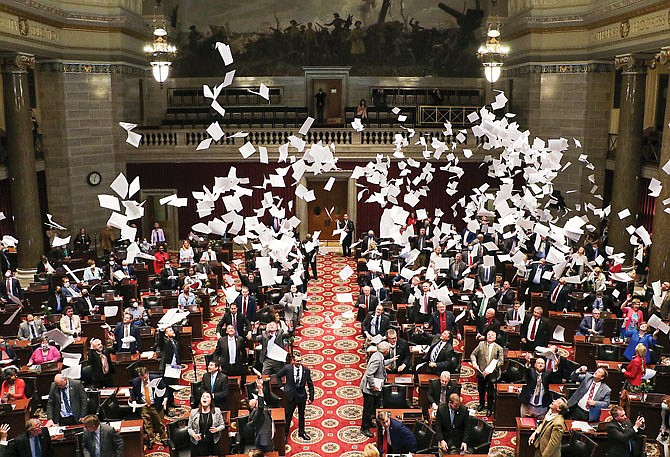[<a href="https://www.newstribune.com/news/health/" style="color:#33AEFF">access the News Tribune Health section</a>]
This spring's legislative session during a pandemic was like no other in Missouri's history, but even with little time to get anything beyond budget work done, leaders after the last day of session Friday counted some victories.
For weeks in March and April, Missouri House members and senators alike took precautionary absences from the state Capitol because of the COVID-19 pandemic. When lawmakers did return to accomplish work on a supplemental budget for 2020 and next year's budget for 2021, people entering the building were health-screened and had their temperature taken, and the public was encouraged to view and participate in the proceedings remotely.
Once 2021's budget was passed, that only left lawmakers a week to try to finish work on anything else.
Republicans and Democrats alike in the Senate said Friday they were still able to get some other important work done over the course of the stop-and-go session.
Senate Majority Floor Leader Caleb Rowden, R-Columbia, said "we don't have a lot of disappointments, frankly."
Senate President Pro Tem Dave Schatz, R-Sullivan, counted achievements including legislation on license reciprocity and punitive damages.
Gov. Mike Parson focused in particular on license reciprocity and other changes to professional registration in his review of session, a statement Friday from his office said.
Parson last month signed HB 1511 and 1452 to give military spouses the ability to obtain an occupational license received in another state.
"HB 1511 and 1452, as well as other professional registration license reform legislation including HB 2046, have put Missouri ahead of the pack - no other state has enacted the reforms that Missouri has on professional licensing reform," according to the statement from Parson's office.
Senate Democrats counted successes including an expansion of absentee mail-in ballot voting, some expanded health care for women, and legislation that includes that any Missourian who is recommended by a health care provider to have a test for COVID-19 shall receive the test and its results for free.
According to a news release from Senate Democrats, the House bill that includes the provisions on free testing has an emergency clause, meaning it would take effect upon Parson's signature.
Both parties included among their successes legislation related to justice for survivors of sexual violence.
The Senate also on Friday unanimously passed a House bill that establishes authorized electronic monitoring in long-term care facilities to help combat abuse and neglect.
The legislative session by no means went perfectly for everyone, however.
Senate Republican and Democratic leaders alike wanted to pass a prescription drug monitoring program, or PDMP, to help address the opioid addiction public health crisis, but that legislation hit a wall in the Senate on Friday among some Republican senators.
Missouri is the last state in the country to establish such a monitoring program. St. Louis County does have a PDMP that Schatz said covers approximately 85-87 percent of Missourians but not everyone.
Another issue without results at the end of session was the proposed establishment of a Wayfair online sales tax that has been projected to possibly bring in up to $80 million a year in revenue for the state.
A Wayfair tax gets its name from the U.S. Supreme Court case in which it was decided out-of-state sellers can be required to collect and remit a state sales tax.
Missouri is one of two states - the other being Florida - that has not yet enacted a Wayfair tax, and with the pandemic, much of the shopping happening is online.
Rowden said he'd be open to a special session on Wayfair.
"I think he'd be justified in making that call," he said if Parson were to call a special session on the issue, given the current situation.
Schatz said "in a more focused environment, I think we could hammer out the details," but there just had not been enough time in regular session.
Rowden said he expects any Senate bill on Wayfair would include some kind of offset - as some lawmakers against any new taxes have argued for, such as making a Wayfair tax revenue-neutral - but the questions would be what kind of offset and how much of one.
The Senate Democratic Caucus's leader, Sen. John Rizzo, of Independence, said, however, a Wayfair bill with an offset "seems irresponsible."
Rizzo was also open to a special session - which may be necessary for budgetary reasons, due to the pandemic and the possibility of further federal aid - but wanted any policy discussions during a special session to be limited to ones related to COVID-19.
He said the only way to maybe fit Wayfair into that would be if it did not have an offset and allowed municipalities to collect some of the revenue they're losing because of closed businesses during the pandemic.
It's unclear if or when lawmakers might return for a special session.
The full list and details of what Missouri lawmakers passed this session is available by searching on the House and Senate's websites for truly agreed and finally passed bills.
Parson's actions on bills will be posted at governor.mo.gov/actions/legislative-actions.

